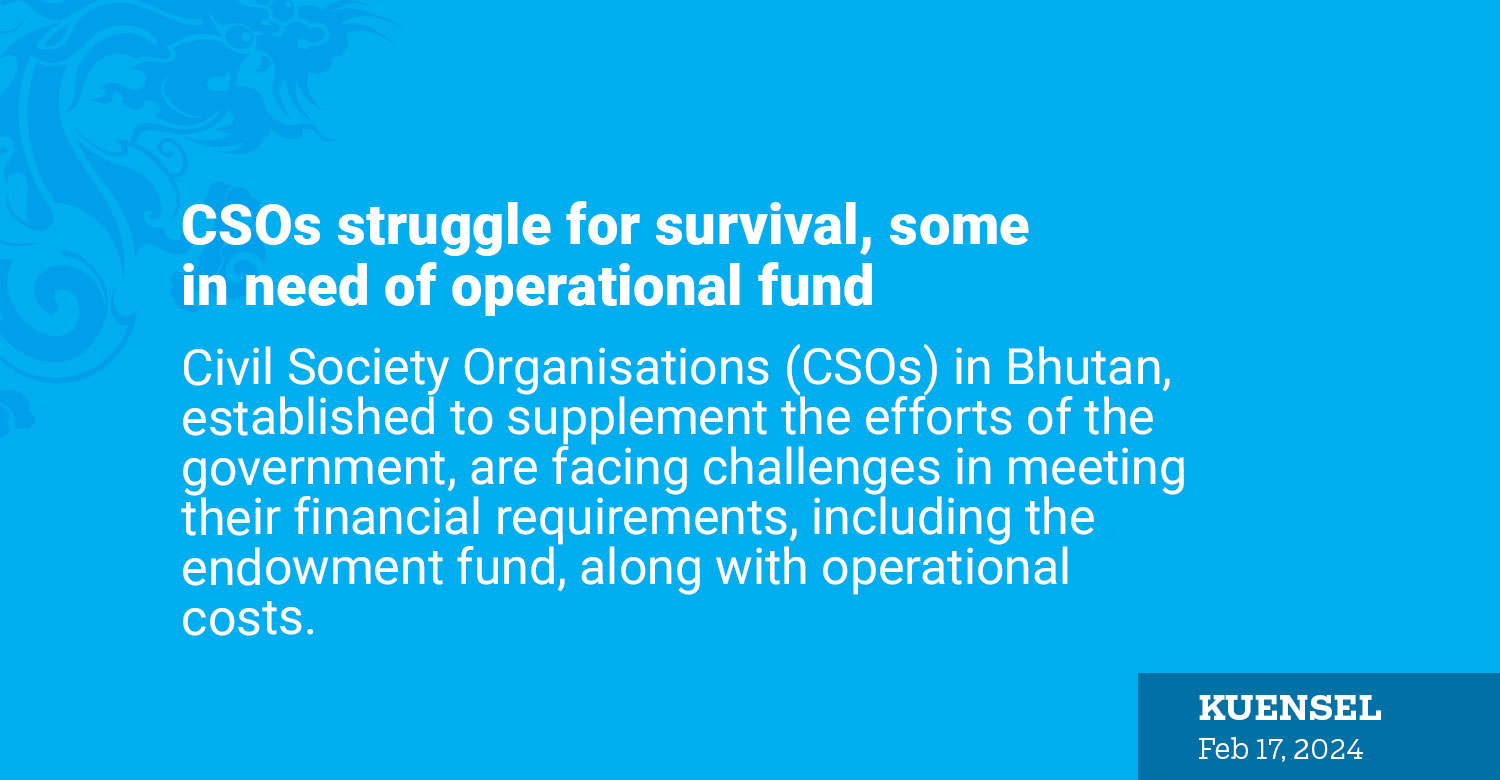YK Poudel
Civil Society Organisations (CSOs) in Bhutan, established to supplement the efforts of the government, are facing challenges in meeting their financial requirements, including the endowment fund, along with operational costs.
To enhance the visibility of CSOs, the CSO Authority (CSOA) introduced an endowment fund requirement under their Act. Public Benefit Organisations (PBOs) should have a minimum endowment fund of Nu 4 million including Nu 1M operational fund reserve, while Mutual Benefit Organisations (MBOs) should have Nu 2M endowment fund inclusive of the Nu 0.5M operation fund.
This initiative aims to strengthen the long-term financial sustainability and stability of CSOs. However, with an increase in the number of CSOs, collaborative decision-making and programme delivery have become a challenge.
Hendrik Visser, the executive director of Bhutan Animal Rescue and Care (BARC), views the endowment fund positively but emphasizes the need for more sustainable solutions. “The authority has not groomed the CSOs well—expecting a return without investment is a stupid demand.”
“The charge is too high that existing ones will gradually fade while new ones won’t come in,” he said. “There is no real discussion on improving CSOs as a whole from the bureaucrats. Government’s role should be facilitation of the services, not taking up every role leading to lapses.”
He highlighted the lack of platforms for CSOs to discuss challenges and suggested that proper strengthening of CSOs is essential for effective community service.
Similarly, Tshering Penjor, executive director of the Bhutan Taxi Association (BTA), expresses concerns about raising the required endowment funds, citing operational struggles.
“So far, approximately between 200,000 and 300,000 has been raised—raising the exact amount seems impossible within a year,” he said.
He emphasises the importance of CSO networking programs to facilitate mutual support and benefit. “Forcing all taxi drivers to be part of BTA is unethical.”
Passang Norbu, executive director of the Journalists’ Association of Bhutan (JAB), raised the challenges in raising funds and meeting operational costs. “With 200 registered members raising Nu 50,000 a year, meeting the operational cost is also a challenge.”
“MBOs do not have a streamlined business to raise funds—JAB gets project-based funds which are in smaller amounts and have to be utilised for projects, annual awards, training, and workshops,” he said.
He stresses the impact of the pandemic on funding sources and suggests exploring avenues for merging CSOs with similar functions to optimise resources. “Not a single penny has been raised so far—JAB struggles to meet the daily operational costs,” he said.
Karma Tobgay, the executive director of Bhutan Cancer Society (BCS), raised the same issue. “Do the authority expect us to ask for money from the cancer patients? Or do business, while the mandate is to help the disadvantaged,” he said.
“The demand is three million endowment fund and one million operational fund—so far, not a single amount has been raised,” he said.
Emphasising the need for timely government intervention, he suggested that the government should facilitate venturing into social enterprises or help with seed funds.
Kunzang N. Tshering, the executive director of Ability Bhutan Society (ABS), stressed his dissatisfaction with the untimely reform. “All the members of ABS are parents of children with disability—asking fund to be parked is inapplicable,” he said.
The authority, he said, should look into reducing the amount based on the size of the CSO or give some more time so that CSOs have adequate time to work on it.
One of the CSOs said that the CSOA has not reached out to them so far. “The CSOA has neither encouraged us to get projects and funding nor studied the challenges that we are facing.”
Government intervention is seen as crucial in strengthening CSOs and maximising societal benefits. However, the composition of the CSOA is still under process, delaying the implementation of plans and procedures.
The CSO fulfilling the mandates of the government is a fairly new concept—the dearth of understanding the roles of CSOs by the policymakers, legislators, and media is reflected as one of the challenges in the CSO network report.
The CSOA serves as the governing body for CSOs, regulating their operations in accordance with relevant laws and fostering a conducive environment for their activities.
The CSO Act of Bhutan, enacted in 2007, provides the legal framework for the establishment and operation of CSOs.
Currently, there are 39 PBOs and 12 MBOs categorized under various thematic areas, reflecting the diverse interests and focus of CSOs in Bhutan.


